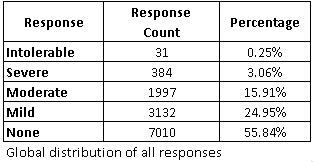Session Information
Session Type: ACR Poster Session C
Session Time: 9:00AM-11:00AM
Background/Purpose: In the pre-biologic era, major costs faced by patients with RA included hospitalization and joint replacement. Biologic agent development has led to increasing outpatient costs. The effects of this from a patient’s perspective have not been thoroughly explored although modeling exists in the oncology literature1. The purpose is to present patients’ perspective of how medical costs impact their view of financial burden in rheumatologic care.
Methods: In this retrospective cross-sectional study, the US Rheumatology database JointMan® was utilized. Patients complete a financial impact form at every visit. Patients respond on a Likkert scale to the question, “How much of an impact does the cost of your medical care received from our office have on your life financially?” Response options: intolerable, severe, moderate, mild or none. Percentages of each response category were calculated for the time periods: 4/20/15–6/15/15, 10/20/2015–12/15/20, and 4/20/15–6/15/2016. Patients were also asked whether their financial situation would cause them to skip visits, postpone a visit, have difficulty paying for a visit or medication, cut dosage of medications, skip doses of medications, or fail to fill a medication.
Results: Of the 12554 responses, the mean patient age was 58, 73.11% female; 90.94% Caucasian. All patients had Medicare or private insurance; none were uninsured.
A two-sided T-Test comparing the “none” category for the April 2016 time point to all other categories combined revealed a statistically significant relationship t=21.87 (p<0.0001).
Conclusion: Surprisingly, there was an increasing trend in the “none” category indicating no perceived financial impact. Potential explanations include that this analysis was mostly from one large rheumatology practice where all patients surveyed were insured. In this population health insurers recognize the importance of biologics and were more likely to approve therapy. Competitive financial strategies are employed by pharmaceutical companies offering multiple or substantial co-pay assistance. ACR guidelines for treatment pathways are published including recommendations for biologic therapy which may aid insurance coverage.
1. Khera, N. J. Clin. Onc, 2014. 32(29)3337
To cite this abstract in AMA style:
Craig G, Knapp K, Ferguson K, Schwartzman S. The “Financial Toxicity” of Therapy in Patients with Rheumatoid Arthritis [abstract]. Arthritis Rheumatol. 2016; 68 (suppl 10). https://acrabstracts.org/abstract/the-financial-toxicity-of-therapy-in-patients-with-rheumatoid-arthritis/. Accessed .« Back to 2016 ACR/ARHP Annual Meeting
ACR Meeting Abstracts - https://acrabstracts.org/abstract/the-financial-toxicity-of-therapy-in-patients-with-rheumatoid-arthritis/


